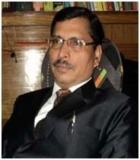Creation and Criticism
ISSN: 2455-9687
(A Quarterly International Peer-reviewed Refereed e-Journal
Devoted to English Language and Literature)
Vol. 06, Joint Issue 20 & 21: Jan-April 2021

Research Paper
CL Khatri’s Poetry: An Adventure into the Harsh World of Reality
Sanjay Sharma & Vinay Shanker Shukla
Abstract
C.L. Khatri is an authentic poetic voice in Indian English Poetry. His wide ranging themes include spirituality, social evils, issues related to Nature and ecology, human relations, mythology and even sex. In his criticism of the social evils, he is on the line of Ezekiel. His poetry has the smell of the Indian soil. He writes in the postcolonial context and wishes to be free from the colonial baggage.
Keywords: Harsh world of reality, Ecology, Indian soil, Postcolonial context, Colonial baggage
C.L. Khatri, an academician, editor of Cyber Literature, is an authentic poetic voice in Indian English Poetry. He has so far produced four poetry collections in English, namely, Kargil (2000), Ripples in the Lake (2006), Two-Minute Silence (2014) and For You to Decide (2016). After establishing himself as a reputed scholar and critic of literature, Khatri has taken up the adventure of writing poetry in a world in which 'Poetry does not sell". In fact, his poetry is not a saleable commodity rather it is noble undertaking. According to him poetry moves, transports, provokes and even unmasks. His two poetic volumes Two-Minute Silence (2014) and For You to Decide (2016) show him as a poet of great merit. While in the first volume, he is shocked by the ironies and bitterness of the world, in the second he resigned as judge of things and leaves everything for the reader to decide for himself. He finds reality everywhere veiled and masked. He is preoccupied with removing this mask and bringing the naked reality to the reader's eye:
Now no layers of mask
can hide you from me.
Everything looks transparent from this land. (For You to Decide 14)
His vision is panoramic and almost every relevant theme is grist to his mill. His wide ranging themes include spirituality, social evils, issues related to Nature and ecology, human relations, mythology and even sex. The two poems on mother "Homage to Maa" and "Mother" are distinctive in their treatment of the emotional bond. In the former, emotion dominates while in the later, a sense of wonder on her varied roles takes the upper hand. Here are the lines from "Homage to Maa":
Absence shows one's real worth
Today I feel her more intensely
Than ever I did. (Two-Minute Silence 22)
In the later, with the help of mythological references, the mother's multiple roles are illustrated:
Kali killed millions; Sati immolated herself;
Garland of human heads; garland of faded flowers.
Both are mothers. (Two-Minute Silence 29)
At various places Khatri shares similarities with great poets like Nissim Ezekiel and A.K. Ramanujan. In his Indianness, approach to mythology, treatment of human relations, and approach to Nature he resembles A.K. Ramanujan. In his quest for identity, his philosophical approach to life and psychological realism, he is close to Ezekiel. Like Wordsworth's Skylark he is true to heaven and home. He doesn't wish to be a man of the world, neither an out and out spiritualist. The following lines from the poem “Peaceful Soul” are notable for what Gagan B Purohit says, “search of a long standing solution to the present crisis and synthesis...” ( 227).
I make my way in between them.
the third man murmuring
Om Shanti Om. (Two-Minute Silence 14)
These lines remind us of Ezekiel's poem "A Time to Change". Man has to silence his own self and to go into alien land. The most important thing is that man's greatness lies in his being a creator. Old things do not fit in the new context. As time changes one has to change. This change makes man's life dynamic progressive and meaningful:
He has to build something with able hands
And knowing eyes, with some instruction.
From his parents, ancestors and friends,
Altered slightly here and there to suit his strength. (CP 4)
Khatri's poems on mothers recall Ramanujan's "Of Mothers, Among other things". The poet's own mother becomes the representative figure. The vivid pictures of the poet's mother in youth remind one of the boundless love of Indian mothers towards their children. Her devotion to the household duties is religiously Indian. He is all praise and sympathy for the pains she takes for the well being of the family:
My old parchment tongue licks bark
in the mouth when I see her four
still sensible fingers slowly flex
to pick a grain of rice from the kitchen floor. (CP 61)
Both Khatri and Ramanujan have written poems, entitled, "River". The approach of both of them is realistic. Ramanujan pinpoints the ugly reality of a flooded river. Khatri points out that a river witnesses last rites almost daily. Mark the lines from Khatri's poem:
With sand, soil and wastes
water grew thick like mud
a rhinoceros lazily lying
peeped at me through the skin of the mud
and said, "Ram nam satya hai." (Two-Minute Silence 16)
In his criticism of the social evils, Khatri is on the line of Ezekiel. Like Ezekiel, he criticizes the society for its ignorance as well as for its mismanaged schools. While Ezekiel ridicules the incorrect English spoken by Indians, Khatri criticizes the lack of seriousness in "Government Schools":
two lakh teachers
without any features
the minister pleads
building blocks of future
the poet cries
Fucking Future. (Two-Minute Silence 19)
But Khatri is entirely different at places. While Ezekiel came to India from outside and Ramanujan went away from here, Khatri lives and thinks in India and like a complete Indian. His poetry has the smell of the Indian soil. Sample the lines that depict Holi—the most popular Indian festival with the help of a popular folk tune:
Jogiji wah Jogi ji
The sun is getting drunk
As the old are going berserk
Holi is sparing none. (Two-Minute Silence 55)
Khatri's philosophical poetry is best represented by the poem "I Have God." Here the poet wishes for a direct communion with God without any aid from a godfather. Although the path of life is rugged, he is sure to reach his goal of life with the grace of God, the father:
I don't have godfather
I have God; I haven't seen.
I will go wherever He takes
or bank on my dwarf to crave
a path through hillocks of life. (For You to Decide 30)
The poet is a great student of the human psychology. The exploration of the labyrinths of the human mind is a complex process in itself. Psychologists have studied them with reference to the conscious and the unconscious as well as id, ego and super-ego. He prefers the ugliest psychological realities to the most fascinating romantic flights. The inner reality is more important for him as it governs the human behaviour from within. The following lines from the poem "Paedophilia" points out that even a sanyasi's self has its dark side:
A sanyasin watching
adult film at the dead of night.
I wonder
if Adam's temptation was paedophilia. (For You to Decide 58)
Khatri writes in the postcolonial context and he wishes to be free from the colonial baggage. He is at home in his own self. He doesn't want to see the world through colonial glasses:
I lay claim to Jesus and Adam
You better keep the Apple and its temptation.
The skin I am born with is mine
with sun, moon and rain it shines. (For You to Decide 43)
Both the poetic volumes—Two-Minute Silence and For You to Decide have "Haiku" as tailpieces. In them the poet thinks in a new way and surprises with his supposed conclusions. Sudhir K Arora’s comment about Khatri's Haiku is worth quoting here:
Through his haiku, C L Khatri strikes the intellect, appeals the heart and creates the picturesque world where the reader wonders at the ideas, presented in the reel of images. The three line pieces just open the vista of mind that expands itself while associating with the experiences of the poet. Though he is not a haiku poet in the traditional sense, he excels in content when he is compared with the haiku poets. He reveals practical dimensions, bitter truth, contemporary colours, philosophical reflections, romantic fervours, political concerns, and natural environment through his haiku which offer matters to weigh, to consider, and to reflect. (146)
Perhaps Khatri took a lesson from it and separated non-conventional haiku in a separate section titled 'Three Liners' and included twenty six of his haiku composed in traditional mode in his poetry collection For You to Decide. Take for example:
Covered with snowflakes
Blood of humanity frozen
Let us make some fire. (For You to Decide 78)
…
Flowers bloom and blush
Waves rise and fall but not wail
The art of living. (For You to Decide 77)
In the following lines, he says if Gandhi had escaped Godse's bullet he would definitely have committed suicide as his values were already dying in new India:
World rejoiced
Gandhi escaped Godse's bullet
committed suicide. (For You to Decide 71)
The wonder of God's creation is summed up in the following lines:
With a stroke of brush
He makes the world colourful
What a magician! (For You to Decide 80)
All these examples prove that Dr. Khatri is a poet of immense worth. He has produced volumes which draw our attention amid a sea of books. This is a proof enough to prove that his poetry will survive the test of time.
Works Cited
Arora, Sudhir K. “Colours of life in C. L. Khatri's Haiku.” International Journal on Multicultural Literature 6.1 (January 2016).
Dhardwadker, Vinay. (Ed.) The Collected Essays of A.K. Ramanujan. New Delhi: O.U.P., 2004.
Ezekiel, Nissim. Collected Poems. New Delhi: Oxford University Press, 2015.
Khatri, C.L. Two Minute Silence, New Delhi, Authorspress, 2014.
---. For You To Decide. New Delhi, Authorspress 2016.
Purohit, Gagan B. Tracing Roots of Indigenous Poetry in English. Jaipur: Aadi Publications, 2018.
About the Authors:
 Dr. Sanjay Sharma is an Assistant Professor in the Department of English, P.S.M. P.G. College, Kannauj, UP. His research work is on “Social Criticism in the Works of V.S. Naipaul.” He has published scholarly papers in different journals and participated in various national and international seminars. He can be contacted at sharmasanjayknj@gmail.com
Dr. Sanjay Sharma is an Assistant Professor in the Department of English, P.S.M. P.G. College, Kannauj, UP. His research work is on “Social Criticism in the Works of V.S. Naipaul.” He has published scholarly papers in different journals and participated in various national and international seminars. He can be contacted at sharmasanjayknj@gmail.com
 Dr. Vinay Shanker Shukla is an Associate Professor in the Department of English, D.A.V. College, Kanpur. Fourteen research scholars have received Ph.D. degree under his supervision. He has published scholarly papers in various journals and participated in various national and international seminars. He can be contacted at drvinayshukla77@gmail.com
Dr. Vinay Shanker Shukla is an Associate Professor in the Department of English, D.A.V. College, Kanpur. Fourteen research scholars have received Ph.D. degree under his supervision. He has published scholarly papers in various journals and participated in various national and international seminars. He can be contacted at drvinayshukla77@gmail.com


